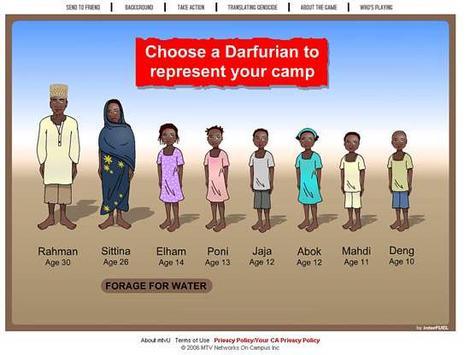Serious games: tackling real world problems through video games
SMH LiveWire | November 16, 2006
Game makers are tackling real-world problems, writes Chuck McCutcheon.
IF YOU’RE a video game player whose social conscience isn’t fulfilled by shooting villains or scoring points, your options are expanding: you can broker a Middle East peace deal, run a drought-stricken African farm or pick fruit as a migrant worker.
Game developers are increasingly using their products to bring attention to real-world problems. People who study the “serious games” industry say the designers are keen on showing the public that interactive games offer more than entertainment.
Screen grab from the Dafur is Dying Game
“People who grew up with games are saying, ‘Why should we not use this technology to try to change this environment that I’m in?’ ” says Henry Jenkins, director of the Massachusetts Institute of Technology’s comparative media studies program and author of 11 books on media and society.
Currently, there are about 50 serious games dealing with social themes, with at least that many in development, says Suzanne Seggerman, executive director of Games for Change, a New York advocacy group.
“This is an area that has a whole bunch of potential,” she says.
Ms Seggerman and Mr Jenkins were among the speakers at the recent Serious Games Summit, held in Virginia. Over two days, more than 500 video game executives, designers and academics discussed ways to improve the content of educational and instructional video games used in government, the military, health care and business.
“One of the things that games are so good at is that they put you in the shoes of people and give you a gut-level understanding that reading can’t duplicate,” says Noah Falstein, a consultant who also spoke at the conference.
In the game Darfur Is Dying, designed by University of Southern California students, players are inside a refugee camp collecting food and building shelter or outside the camp seeking water.
Since its launch six months ago, the game, which is available free at Darfurisdying.com, has been played almost 2 million times, with more than 100,000 new users in the past month alone, says Stephen Friedman, general manager of mtvU, the college-oriented television network that sponsors the game.
“They’ve made it incredibly addictive,” Friedman says. “You don’t know exactly what you’re getting into, and you play all the different characters trying to survive.
“It’s a terrifying realisation that this is happening every day, and it gets under your skin.”
The network soon will unveil another online game, called Squeezed, in which multiple players use anthropomorphised animals to portray migrant farm workers, drawing attention to matters such as labour exploitation and immigration reform. Animals collect fruit as quickly as they can – the fruit is then “juiced” and juice flows in varying amounts to farm owners, workers and workers’ families.
At Michigan State University, students are developing “Energy Crisis”, which examines the consequences of switching to renewable energy sources, said Brian Winn, co-director of the school’s Games for Entertainment and Learning Lab.
Among other socially conscious games with an agricultural theme is Third World Farmer, a 2005 student project from Denmark’s IT University of Copenhagen (http://heavygames.com/3rdworldfarmer/showgame.asp). The game challenges players to stay alive through drought, disease, civil war, falling market prices and exposure to toxic waste from a chemical company that wants to lease their land.
“As the average computer game player is getting older, there’s going to be a larger market for games dealing with serious issues,” says graduate student Frederik Hermund, who helped design the game.
In the game there is no way to “win”, something Mr Hermund says has left many players frustrated, adding that the new version will not be “so bleak”. “We’re trying to implement ways to solve some of the problems by building roads and communications. I hope we’ll get less hate mail.”
But some industry observers remain sceptical about the market for socially conscious games, noting that most have been developed by university students under the auspices of foundations or non-profit organisations.
But Eric Brown, developer of a new diplomatic game called PeaceMaker, predicts popularity will grow as people realise this is not traditional “gamer” fare.
“Once you can expand and go beyond that demographic, it will become easier to support titles like this,” he says.
In PeaceMaker, which has been tested at schools and is expected to be released soon, players choose between the roles of Israeli prime minister and head of the Palestinian Authority, then try to achieve peace through a two-state solution.
The game incorporates news footage of real events as leaders respond to suicide bombings and other crises.


Recent Comments